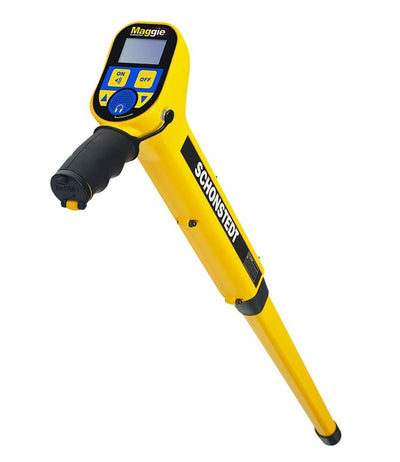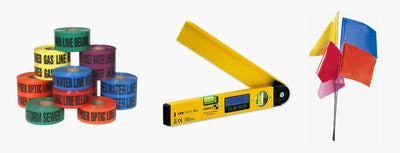There are a handful of land surveying tips out there, but you’ll have to scroll through numerous forums to sift through them and find some that will actually work for you. However, in this article, you’ll find tried and tested tips and techniques that people learned from years on the job.
- I. Why land surveying tips make the job easier
- II. Bring more than you think you’ll need
- III. Dress and prepare for the weather
- IV. Bring canned air
- V. Pencils and field notes are your friends
- V. A small pocket mirror can be handy
- VI. Keep your knowledge updated
- VII. Find ways to keep one hand free
- VIII. Consider using metal detectors
- IX. Be a good team player
- X. Build a rhythm with your crew
Why land surveying tips make the job easier
There are things that professionals learn in the field, like basic techniques and theories. However, there is also a plethora of things that you can only learn from veterans who have put in years of hard work and have learned a thing or two from experience. Sometimes, only experience can teach you how to be more efficient or teach you the little changes you can make in your routines to become more efficient.
From ensuring your comfort in the field to making sure you work well with your crew, these tips and tricks of the trade can improve your day-to-day life at work.
Bring more than you think you’ll need
It’s better to have something and not need it than to need it and not have it. This is a good principle to remember, especially when you have to travel a long way to the job site or if the site isn’t that easily accessible. You might end up needing a particular instrument, or you might run short of something.
Thus, it’s a good idea to bring things like extra pocket tape or to bring along your complete gear even if you don’t anticipate that you’ll use all of it. Bring along your brush axe, or even just a pair of high-quality branch scissors that can easily get pesky branches out of the way of your total station. You can always choose to bring along lightweight tools and instruments so you won’t have to weigh down your gear bags and pockets.
Of course, since you’ll be bringing a variety of instruments, it will also be good practice to keep track of where they are. If you keep your scissors in your right pants pocket, it’s best to put it back there after every use. This is especially important if you’re surveying by yourself, and it’s going to save you the time you’ll inevitably spend rifling through your bag to look for what you need.
Dress and prepare for the weather
Surveyors don’t get to pick the weather, and sometimes you’ll have to go out on the field even though the temperatures and weather conditions aren’t optimal. Depending on where you are, you either have to deal with working under the sun, or in cold temperatures with brisk winds.
If you live and work in a colder climate, it’s important to wear clothes that will allow you to stay warm while still allowing you to retain a good amount of flexibility and mobility. It will be a good idea to avoid wearing cotton, and to stick to fleece or wool covered by a windproof and/or waterproof material. If there is a ski shop nearby, you can ask them what your options are.
Also, wear good boots and keep your head covered. Of course, if the temperature drops too low, it might be good to consider putting the job off for another day with better weather conditions.
Meanwhile, if you work somewhere warmer, dress in lightweight and light-colored clothing. One thing that you might also want to do is to use body powder to avoid sweat and uncomfortable stickiness.
Additionally, keep plenty of cool water, and it might be a good idea to bring along some liquids to keep yourself hydrated. It’s important to keep yourself safe from heat-related illnesses and to recognize the first signs of heat stroke. Keep an eye out for dizziness, nausea, pale or red skin, seizures, and more. Additionally, don’t forget to put on sunblock to protect yourself from harmful sun rays.
When visibility is an issue, be sure to wear appropriate high-visibility clothing and gears.

Bring canned air
Sometimes, during the course of land surveying, you might come across some survey markers or monuments buried underground. Depending on the area you’re in, you might also come across headstones. Chances are that you’ll want or need to see what’s written on the survey markers, and you’ll want to jot down as many accurate descriptions as possible.
However, there’s also a chance that you might cause damage of some sort, and it’s always best to avoid coming into contact with survey markers and the like. To protect them from damage and still make them readable or discernible, you can use canned air.
In place of canned air, however, you can bring and use something like a Shop-Vac. This is especially useful when the dirt and debris are harder to get rid of and are too tough for canned air to handle. However, it won’t always be possible to bring a Shop-Vac around to the job site.
Pencils and field notes are your friends
The best land surveyors understand the importance of taking detailed and good field notes. After all, field notes will likely include measurements, angles, and more. They basically keep a record of the results of the day’s work.
Thus, it’s imperative to keep pencils and a sharpener in your field kit. This way, if you break the pencil tip or if the tip gets too dull, you’ll be able to sharpen it again on the spot.
Another idea is to bring a few colored pencils to the field as well. You’ll be able to use specific colors to signify different things and ensure that your notes and sketches aren’t confusing. You can sketch in graphite, but you can choose to label parts of your sketch using a colored pencil.
Easily discernible and understandable notes can save you a lot of time. Having sketches, plans, and calculations at the ready can make a work day go much more smoothly and can help prevent you and your crew from wasting time.
If you are so inclined, you can also choose to bring other stationery supplies to keep your notes neater and easier to handle. For example, a windy jobsite can make handling notes difficult because the wind can blow pages away. A binder clip or two can prevent this from happening; these clips can also come in handy in other situations.

A small pocket mirror can be handy
Land surveying can sometimes take you to unpredictable spots, which can sometimes include thick brush. Areas like this can make it quite easy for crew members to lose track of each other. Instead of yelling out for each other or walking around to see where your other crewmates are, you can all keep a small pocket mirror and use the reflection to keep track of each other. For example, the rod man and the instrument man can use the light reflecting from the mirrors to communicate.
These mirrors can be especially handy when it’s sunny out. The reflected light can even look like a laser beam coming out of the bushes, so a mirror can indeed be an effective tool. This small, lightweight object can easily slip into a pants pocket or a compartment in your gear bag.
If a mirror won’t cut it, or if there isn’t enough sunlight, you can bring along a small blinking bicycle light instead. This light is also more suitable for use during the winter than a mirror, since there won’t be enough light for a mirror to reflect. If you attach the bicycle light to your rod, it can yield the same results. Just like a small mirror, a bicycle light can fit easily into a pocket and is light enough to be easily included in your gear bag.
Keep your knowledge updated
All professionals can benefit from continuing education, and surveyors are no different. Aside from keeping yourself up-to-date on the newest techniques and technologies, it’s also important for a surveyor to have a good grasp of land laws. After all, surveyors are often instrumental in helping establish property boundaries. Thus, surveyors need to be able to work with clients and attorneys. Surveyors can also sometimes be called as an expert witness in court cases.
Other than legal knowledge, surveyors would do well to keep their math skills sharp. Of course, computer programs and calculators can do all the heavy lifting, mathematically speaking. However, surveyors will still benefit from a good understanding of mathematical concepts.
Find ways to keep one hand free
Having your hands full -- literally -- can be overwhelming and can reduce efficiency. As a result, you may end up spending more time than necessary on the jobsite. Keeping at least one hand free at all times can help you improve your efficiency and organization. By keeping this in mind, you’ll be able to do more things more quickly, and you’ll be better at organizing your instruments and tools.
There are a number of ways that you can keep your things close to you without having your hands literally full. You can use a holster to help you carry a variety of different instruments, and you can even do things like strap dog collars to your backpack so you can easily slip instruments in and out. This will help you keep tools easily accessible without having to hold on to them.
Interestingly, you can also learn how to balance a hammer on your shoulder. Just hook it over your shoulder, and both your hands can be free to make entries in your field book, make calculations, and a number of other things. Learning this little trick can end up saving you a lot of time, and you’ll be able to keep whatever momentum you’ve already built on a task.
Consider using metal detectors
Metal detectors or magnetic locators can be quite helpful in land surveying. They can be especially helpful when looking for survey markers in a particular area. Because most survey markers in the United States today are made of metal, magnetic locators can be helpful in sniffing them out.
There are several locators that have been proven to be reliable on the field. Schonstedt magnetic locators in particular have built a reputation for being durable and highly accurate. With one of these locators, you can save a lot of time on the job, and you’ll be able to look for survey markers much more efficiently.
If you’re planning on using a magnetic locator to look for a survey marker, it might be a good idea to bring plastic tent stakes along with you. You can use these stakes to mark four corners in an area of your choosing, and you can begin looking for survey markers within those four corners. The stakes will help you keep track of areas you’ve already covered, and because they’re plastic, they won’t confuse your locator.
A bad magnetic locator can severely impact the progress of your task. Failing to find a particular marker can really set you back, so it’s important that you choose the right locator. The Schonstedt GA52 magnetic locator, for example, has built a reputation among surveyors as a reliable instrument.
Be a good team player
Surveyors can work solo, but there will also be times in which they’ll need to work with a crew. As with nearly every other profession, it’s important to build good professional relationships with the people you work with. Make sure to give them the correct responsibilities, and it will be a very good idea to keep their morale up.
Of course, critique is important in every job position, and patience is key. However, it’s also good to remember to compliment your crewmates, especially when they do the job right. A good working relationship among all members of the crew can help improve efficiency and can motivate crew members to work better and harder.
Furthermore, you might also get the opportunity to train new people and hand down your own knowledge and tricks you’ve learned over your years as a professional. Training new personnel entails having good people skills, and if you’re able to form a good relationship with trainees and new personnel, you can improve your career prospects.
Land surveyors frequently have to work with a variety of people. Thus, it’s important to make sure that you’re able to work well with others, including your crew, engineers, clients, lawyers, town planners, and plenty more. If nothing else, being able to work well with others can help you finish the job more efficiently and smoothly.

Build a rhythm with your crew
Typically, a lot rests on a land surveyor. You’ll also often have the task of setting the rhythm of work on the field, which means that a lot of responsibility rests on your shoulder.
One thing that surveyors are responsible for is calculating grades. It’s good practice to do all these calculations at the office, before you and your crew set out and go to the jobsite. If you end up doing these calculations on the field, you’ll risk stalling the work or preventing it from commencing in a timely manner. This can make your crew lose motivation or momentum.
It’s also a good idea to already have a good and solid plan in place in terms of how you and your crew are going to approach the job for the day. This plan should also be ready before you leave for the jobsite. This way, you can build a good rhythm that can and hopefully will carry your crew for the rest of the day.
Make sure to make crew assignments clear, and each person on the crew should stick to the task you assigned to them. If you can establish this, you’ll be able to help your crewmates work in sync. Furthermore, once you’re able to establish this kind of relationship with your crew, the rhythm can be easier to work out in the future.












